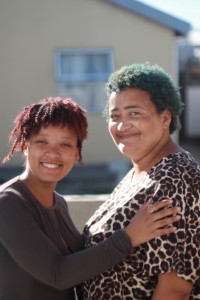Barons lead the charge for women and youth in the Western Cape’s Clothing and Textile Sector

 Hanover Park’s mother-and-daughter duo, Rene and Anusca Baron provide a sterling example of small business success for women within Cape Town’s communities, and demonstrate how an effectively implemented business accelerator programme has helped catalyse their growth. Mother Rene is a jeweller while daughter Anusca is a fashion designer. Together they are Baron Design House (www.barondesignhouse.com), a locally loved clothing, fashion accessories and jewellery brand.
Hanover Park’s mother-and-daughter duo, Rene and Anusca Baron provide a sterling example of small business success for women within Cape Town’s communities, and demonstrate how an effectively implemented business accelerator programme has helped catalyse their growth. Mother Rene is a jeweller while daughter Anusca is a fashion designer. Together they are Baron Design House (www.barondesignhouse.com), a locally loved clothing, fashion accessories and jewellery brand.
They fly the flag for upliftment against the odds and have grown a sustainable business despite the negative economic impact of the pandemic.
They have shown it is possible to create employment for others within their own hard-hit community, tapping into local support being offered to clothing and textile SMMEs – most recently the Cape Skills and Employment Accelerator project. This project, which is now open for another round of SMME applications, got underway in 2021 to boost skills development and capacitate Cape SMMEs to improve and grow production – creating jobs and accelerating the recovery of the clothing and textile sector locally.
This dynamic duo’s story, one of starting out from humble beginnings and rising to meet the future, provides a “proof point” of inspiration for other small businesses – and especially those run by previously disadvantaged women.
Says Baron Design House customer Shane Botters of Mitchell’s Plain: “Great service and the designers have a lot of variety for their clients, and they are very professional.” Fellow fan Thokozani Zuma, hailing from Cape Town, concurs, saying that the brand offers “stunning products, awesome client service. Love the fact that everything is handmade!”
The Baron Design House’s point of difference is due to the passion and commitment behind this family-run enterprise. Rene’s longstanding love for jewellery evolved into passion and vocation when the opportunity arose to put her creative ideas into remarkable pieces of artwork. Her success to date is particularly admirable when you consider that she is largely self-taught. She was not able to complete tertiary training due to financial constraints yet continued develop her talent and business skills.
Anusca’s designs on the other hand, are influenced by her love of experimenting with different styles and breaking away from the norm. She believes accessories are a must-have. “Accessories are not to overshadow your look but to compliment your look and make you feel bold and make a statement,” she states.
The Barons clearly have matched creative talent and business savviness. The demand for their services and products has now seen them grow their home-based business beyond just the two of them. Through the Cape Skills and Employment Accelerator, Baron Design House has taken on a young female learner who is part of a National Qualifications Framework (NQF) learnership, in order to take the next step in their business, while helping that learner develop market-ready skills.
The Cape Skills and Employment Accelerator is focused on creating employment opportunities for youth and women in the clothing and textile industry in Cape Town. The project is made possible thanks to the National Skills Fund in collaboration with the City of Cape Town, and is implemented by the Craft and Design Institute (CDI). Currently there are 23 businesses who are benefitting from the Accelerator project. The aim is to support up to 60 SMMEs to participate in the project and the goal is to train 200 machinists for the sector in total. Applications are currently open until 21 October 2021.
Like Baron Design House, Luspin Manufacture is another rousing example of a local, female-run business that is poised for further growth. This thriving Khayelitsha-based clothing company was founded by Pinkie Luswazi Hlengisa. Luspin exists to design and sell stylish fashion apparel while making a positive impact on society by empowering the unemployed. Hlengisa has already taken on four learners through the project and plans to take on a fifth.
With youth unemployment in the country at a crisis point, providing NQF level training and workplace opportunities for unemployed youth and women makes the Accelerator programme all the more relevant. The programme subsidises most of the costs for the SMME and is designed to offer a 12-month learnership, with a view to the SMMEs employing the women at the end of the project.
“This is not just a skills development project,” says Erica Elk, Group CEO of the CDI, “we are also placing emphasis on the development of the business and its capacity to not only host trainees but hopefully absorb them after the learnership is completed – we are aiming to grow the participating business for long-term sustainability.”
The City of Cape Town’s Enterprise and Investment Department funds Strategic Business Partners, such as the CDI, in high-growth sectors to secure the skills pipelines businesses need to succeed. According to the City’s Mayoral Committee Member for Economic Opportunities and Asset Management, Alderman James Vos: “SMMEs will be able to create a job profile to suit their individual business needs and recruit participants from the learnerships with little cost to the business. Thanks to tax rebates and incentives, a business can reduce the cost even further.”
Small businesses that – like Baron Design House or Luspin – are active in clothing, textiles, leather goods and footwear, and which are on the verge of increasing their production capacity, are strongly encouraged to apply for support. These businesses will be able to use the Accelerator to upskill potential staff and scale their business. At the same time, they will be supported by the CDI. Businesses will be able to recruit their own learners. These learners will need to be recruited from Cape Town but can work anywhere in the province.
The learners themselves will develop skills that include pattern making, pattern cutting, garment making, and sewing. Approximately 75% of the time will be spent in the business, supported by 25% classroom time provided by an accredited training provider. The aim is for the project to help produce other success stories, like that of the Barons…
Apply via: https://www.thecdi.org.za/Accelerator. Applications close on 21 October 2021.





